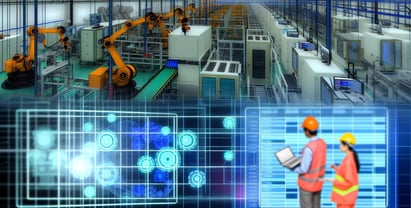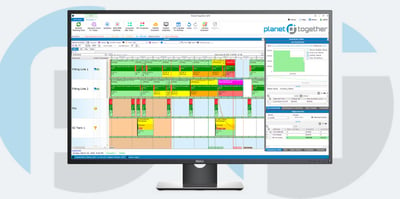Secure and Transparent Scheduling in Global Supply Chains
In the increasingly interconnected world of industrial manufacturing, supply chain managers face unprecedented challenges. The complexity of global supply chains, combined with the need for efficiency, accuracy, and security, demands innovative solutions. One of the key aspects of managing a successful supply chain is scheduling.
In this blog, we will explore how integrating scheduling solutions like PlanetTogether with leading ERP, SCM, and MES systems (such as SAP, Oracle, Microsoft, Kinaxis, Aveva, and others) can help achieve secure and transparent scheduling in global supply chains.

Supply Chain Scheduling
Supply chain scheduling is the process of coordinating and optimizing production, distribution, and inventory management to ensure products are available when and where they are needed. In industrial manufacturing, where production processes can be highly complex and interconnected, efficient scheduling is critical.
Traditional scheduling methods often rely on spreadsheets, manual data entry, and a siloed approach, which can result in errors, delays, and inefficiencies. These challenges are compounded when dealing with global supply chains, where different facilities, suppliers, and partners must be synchronized.
To overcome these challenges, supply chain managers need to adopt advanced scheduling solutions that offer both security and transparency. Integrating such solutions with ERP, SCM, and MES systems is crucial to achieving these objectives.

The Role of Scheduling in Supply Chain Management
Before looking into the integration of scheduling solutions, let's first understand why scheduling is vital in supply chain management:
Optimized Resource Utilization: Effective scheduling ensures that resources such as machinery, labor, and materials are used efficiently, reducing costs and increasing productivity.
Minimized Lead Times: By scheduling tasks and processes effectively, lead times can be minimized, allowing products to reach customers faster.
Reduced Inventory Holding Costs: Scheduling helps maintain optimal inventory levels, reducing storage costs and the risk of overstock or stockouts.
Improved On-Time Delivery: Accurate scheduling ensures that products are manufactured and delivered to customers as promised, enhancing customer satisfaction and loyalty.
Better Decision-Making: Real-time scheduling data provides valuable insights into the supply chain, enabling data-driven decision-making and forecasting.


Introducing PlanetTogether: A Scheduling Solution for the Future
PlanetTogether is a leading advanced planning and scheduling (APS) solution designed to address the complex scheduling challenges faced by industrial manufacturers. It offers a wide range of features that can significantly enhance scheduling processes:
Advanced Algorithms: PlanetTogether utilizes advanced algorithms to optimize production schedules, taking into account various constraints, such as machine availability, labor, and materials.
Scenario Planning: Supply chain managers can create "what-if" scenarios to evaluate different scheduling options and choose the most efficient one.
Real-Time Visibility: The solution provides real-time visibility into the scheduling process, allowing users to monitor progress and make adjustments as needed.
Integration Capabilities: PlanetTogether is designed to seamlessly integrate with various ERP, SCM, and MES systems, making it a valuable addition to your existing technology stack.

Integration with Leading ERP, SCM, and MES Systems
Now, let's explore the benefits of integrating PlanetTogether with some of the leading systems used in industrial manufacturing:
SAP
SAP is a globally recognized ERP system. Integrating PlanetTogether with SAP enables:
Data Consistency: Scheduling data can be synchronized with SAP, ensuring consistency across the supply chain.
Real-Time Updates: Any changes made in PlanetTogether are reflected in SAP instantly, enabling accurate reporting and decision-making.
Efficient Communication: SAP and PlanetTogether integration streamlines communication between production and other departments, reducing delays and errors.
Oracle
Oracle is another prominent ERP system. Integrating PlanetTogether with Oracle provides:
Enhanced Planning: Combining Oracle's planning capabilities with PlanetTogether's scheduling power creates a robust end-to-end solution for supply chain management.
Improved Forecasting: Real-time data from PlanetTogether can be used to improve demand forecasting accuracy within the Oracle system.
Efficient Resource Allocation: Oracle's resource management capabilities can be complemented by PlanetTogether's scheduling algorithms, resulting in optimized resource allocation.
Microsoft Dynamics 365
Microsoft Dynamics 365 is an ERP and CRM system that can benefit from PlanetTogether integration in the following ways:
Unified Platform: Combining Dynamics 365 and PlanetTogether creates a unified platform for managing both customer relations and supply chain operations.
Seamless Collaboration: Employees can collaborate seamlessly, thanks to the integration, ensuring everyone is on the same page when it comes to scheduling and production.
Enhanced Reporting: Real-time scheduling data can be leveraged for in-depth reporting and analytics within Dynamics 365, aiding in strategic decision-making.
Kinaxis
Kinaxis is a specialized supply chain management software. Integrating it with PlanetTogether offers:
End-to-End Visibility: Kinaxis and PlanetTogether integration provides end-to-end visibility into the supply chain, allowing for real-time tracking and quick response to changes.
Scenario Analysis: Kinaxis excels in scenario analysis, which can be enhanced with PlanetTogether's scheduling insights, enabling better decision-making.
Supply Chain Orchestration: By integrating with PlanetTogether, Kinaxis can optimize supply chain orchestration, ensuring a synchronized and efficient flow of goods.
Aveva
Aveva offers solutions for manufacturing execution systems (MES). Integrating Aveva with PlanetTogether brings:
Shop Floor Integration: Aveva MES can be seamlessly connected to PlanetTogether, enabling real-time coordination between production scheduling and shop floor activities.
Quality Control: PlanetTogether's scheduling can take into account quality control processes managed by Aveva, ensuring product quality is maintained.
Traceability: Integration allows for end-to-end traceability of products, essential for compliance and quality assurance.
Benefits of Integration
The integration of PlanetTogether with ERP, SCM, and MES systems provides numerous benefits that can transform your supply chain scheduling processes:
Enhanced Accuracy
Integration reduces the risk of data entry errors and ensures that scheduling data is consistent across systems, leading to more accurate production plans.
Real-Time Visibility
Supply chain managers gain real-time visibility into scheduling processes, allowing them to track progress, identify bottlenecks, and make informed decisions promptly.
Improved Collaboration
Integration fosters better collaboration among departments and teams, as everyone has access to the same up-to-date scheduling information.
Streamlined Operations
Synchronization between scheduling and other systems streamlines operations, reducing delays and improving overall efficiency.
Better Forecasting
Real-time scheduling data can be used for more accurate demand forecasting, helping to optimize inventory levels and reduce carrying costs.
Quick Response to Changes
Integration allows for quick response to changes in production, demand, or supply, helping to mitigate disruptions and maintain customer satisfaction.
Ensuring Security and Transparency
While integrating scheduling solutions like PlanetTogether with ERP, SCM, and MES systems offers significant advantages, it's essential to prioritize security and transparency throughout the process:
Security Measures
Access Control: Implement robust access control mechanisms to ensure that only authorized personnel can access and modify scheduling data.
Data Encryption: Encrypt data transmitted between systems to protect it from unauthorized access during transmission.
Data Backups: Regularly backup scheduling data to prevent data loss in case of system failures or cyberattacks.
Transparency Measures
Audit Trails: Maintain detailed audit trails of scheduling changes to track who made modifications and when.
Data Validation: Implement data validation checks to ensure the accuracy and integrity of scheduling data.
Reporting: Generate reports that provide insights into scheduling processes and make them available to relevant stakeholders.
Training: Ensure that employees are adequately trained to use integrated systems effectively and understand the importance of data security and transparency.
Achieving secure and transparent scheduling in global supply chains is essential for industrial manufacturers looking to stay competitive in today's market. Integrating advanced scheduling solutions like PlanetTogether with ERP, SCM, and MES systems is a strategic move that can significantly improve efficiency, accuracy, and collaboration throughout the supply chain.
By embracing integration, supply chain managers can optimize resource utilization, reduce lead times, minimize inventory holding costs, enhance on-time delivery, and make data-driven decisions. However, it's crucial to prioritize security and transparency measures to safeguard scheduling data and ensure that operations run smoothly.
In an era where supply chain resilience and agility are vital, the integration of advanced scheduling solutions with ERP, SCM, and MES systems paves the way for a more secure, transparent, and successful future in industrial manufacturing.
Are you ready to take your manufacturing operations to the next level? Contact us today to learn more about how PlanetTogether can help you achieve your goals and drive success in your industry.